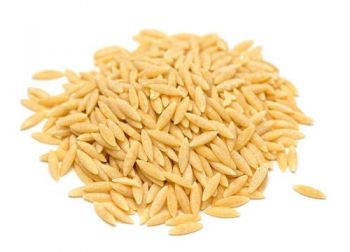Orzo: Difference between revisions
Jump to navigation
Jump to search
Amwelladmin (talk | contribs) No edit summary |
Amwelladmin (talk | contribs) No edit summary |
||
| Line 1: | Line 1: | ||
{{a|glossary| | {{a|glossary| | ||
[[File:Orzo.jpg|350px|thumb|center|Some grainy stuff that is ''not'' [[rice]], yesterday]]}}So that [[rice]] you get with kebabs in Mediterranean cooking ([[orzo]] in Italian, [[κριθαράκι]] in Greek; [[arpa şehriye]] in Turkish) isn't rice at all, but is tiny bits of ''[[pasta]]''. | [[File:Orzo.jpg|350px|thumb|center|Some grainy stuff that is ''not'' [[rice]], yesterday]]}}So that [[rice]] you get with kebabs in Mediterranean cooking ([[orzo]] in Italian, [[κριθαράκι]] in Greek; [[arpa şehriye]] in Turkish and and [[لسان العصفور]] in Arabic) isn't rice at all, but is tiny bits of ''[[pasta]]''. | ||
Interesting: the traditional Israeli [[פתיתים]], is similar, but not the same, being typically spheroid rather than grain-shaped. | |||
{{sa}} | |||
[https://www.bbcgoodfood.com/recipes/collection/orzo Some nice BBC recipes using orzo] | |||
{{egg}} | {{egg}} | ||
Revision as of 17:49, 14 October 2019
 Some grainy stuff that is not rice, yesterday
|
So that rice you get with kebabs in Mediterranean cooking (orzo in Italian, κριθαράκι in Greek; arpa şehriye in Turkish and and لسان العصفور in Arabic) isn't rice at all, but is tiny bits of pasta.
Interesting: the traditional Israeli פתיתים, is similar, but not the same, being typically spheroid rather than grain-shaped.